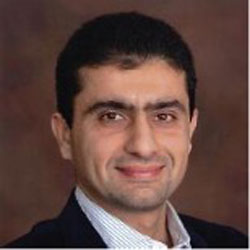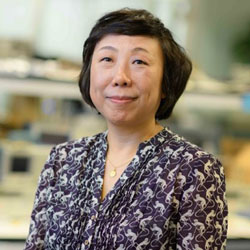
Mehdi Javanmard
Associate Professor
Electrical and computer Engineering department
Rutgers University
Date and time: June 18, 2022, 2:15 p.m. Central Time
Title: Electro-Fluidics: From Basic Research to Clinical Translation
Summary: In this talk, I will discuss my group’s work on fabricating micro- and nanosensing platforms for health and environmental monitoring. In the first part of my talk, I will discuss the fabrication of novel electronic sensing modalities both in vitro and in vivo and the role they can play in electroceutical applications for monitoring chronic inflammatory illnesses, wounds, and infectious diseases. I will also discuss domain specific use of machine learning to enable data-driven biosensors for improvement in accuracy and specificity. Finally, I will talk about our efforts to get our devices out of the lab and into the clinical setting.
Mehdi Javanmard is an Associate Professor in the Electrical and Computer Engineering Department at Rutgers University. He received the BS (2002) from Georgia Institute of Technology and the MS (2004) and PhD (2008) all in electrical engineering from Stanford University. During his time at Stanford, he worked on the development of electronic microfluidic platforms for low-cost genomic and proteomic biomarker detection, and later worked as a Senior Research Engineer at the Stanford Genome Technology Center. In Fall 2014, he joined the Electrical and Computer Engineering Department, Rutgers University as an Assistant Professor. His research interests include developing portable and wearable technologies for continuous health monitoring and understanding the effects of the environment on health. In 2017, he was recipient of the Translational Medicine and Therapeutics Award by the American Society for Clinical Pharmacology and Therapeutics for his group's work in point of care diagnostic tools for assessing patient response to cancer therapies. He has received various awards as a Principal Investigator from the National Science Foundation, National Institutes of Health, DARPA, and the PhRMA foundation to support his research. He was awarded the National Science Foundation CAREER Award for young faculty in 2019 and the DARPA Young Faculty Award in 2020. In 2018, he co-founded RizLab Health, a startup company dedicated to enabling point-of-care hematology analysis.

Steve Hoover
Redwood EDA
Date and time: June 19, 2022, 1:00 p.m. Central Time
Title: Elevating Digital Design to the Transaction Level
Summary: The scaling of integrated circuit complexity has steadily outpaced advancements in electronic design automation. RTL-based design methodologies are no longer adequate. So, what's next? High-level synthesis offers promise for a higher level of abstraction. Domain-specific languages provide modeling flexibility and hardware construction capabilities. These next-generation approaches leverage software abstractions for hardware modeling. This presentation focuses on transaction-level design methodology, an approach that introduces several abstraction mechanisms specifically addressing pain points unique to the hardware design process.
Steve Hoover is the founder of Redwood EDA, an early-stage startup focused on next-generation design methodology. With Redwood EDA, Steve is fostering an open-source hardware ecosystem by providing the Makerchip online IDE, the WARP-V CPU core, and the 1st CLaaS cloud hardware-acceleration framework. He actively contributes to the Transaction-Level Verilog (TL-Verilog) language specification and tools. His online courses and participation in the Open Source FPGA Foundation's Education and Training Committee are redefining digital logic education. Formerly, as an engineer with DEC, Compaq, and Intel, Steve designed components for Alpha, Itanium, and x86 server CPUs and network architectures. Steve holds a BS in electrical engineering summa cum laude from Rensselaer Polytechnic Institute and an MS in computer science from the University of Illinois. He has authored seven patent filings.

Xiaolin Lu
Texas Instrument
Date and time: June 17, 2022, 3:30 p.m. Central Time
Title: Embedding AI for Smart Sensing Applications
Summary: This talk will briefly discuss the key technologies in next 5-10 years in the space of industrial automation and Internet of Smarter Things and how embedded AI will or is playing a role. It will take a PENNY size edge sensor node used in various industrial automation applications as an example to showcase the importance of Hardware architecture, Software and Hardware partitioning, Power and Budget analysis as well as development flow. Some key forward looking semiconductor technologies as fundamental enablers will be briefed as well.
Xiaolin is Fellow and director of Texas Instruments Kilby Labs Sensing & Processing Group responsible for R&D on connected sensors, embedded AI, timing and clocking technologies for industrial internet and automobile applications. She is chartered to drive various semiconductor system level solutions using TI differentiated analog and embedded processors, connectivity, mixed signal components and power management devices. Xiaolin has worked on various embedded processing and communication system programs, including Smart Sensing with edge computing, Intelligent Industrial Internet Sensor Network systems, embedded AI hardware acceleration, Real-Time Locationing Service with wireless, Narrow Band Power Line Communication for AMR/AMI, Wireless and Wired Communication Technologies, Smart Power IPs, Universal MAC for broadband IP, Multi-radio co-existence and digital mobile TV SoC, etc. Xiaolin is well-known as an embedded system and software expert inside and outside TI and has given keynote and plenary talks at numerous technical conferences. In addition, she is the author/co-author of more than 60 U.S. issued patents and the recipient of the special recognition awards: 2016 Asian American Engineer of the Year, Society of Women Engineers (SWE) and National Women of Color award in the Technical Innovation – Industry category. Xiaolin is United Way Tocqueville member for community services. In her free time, Xiaolin enjoys yoga practice, playing piano, listening to classical music and leisure travel.
